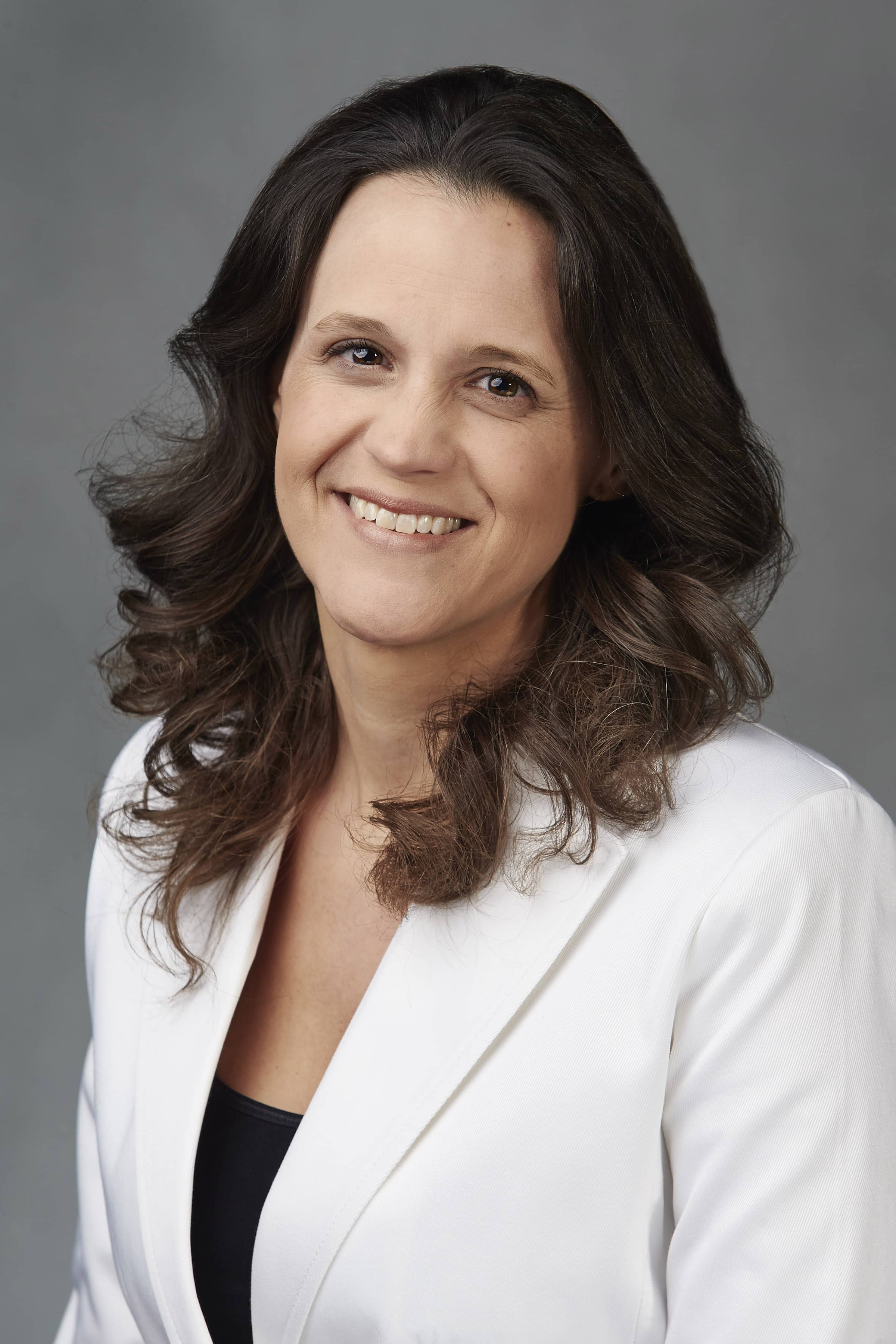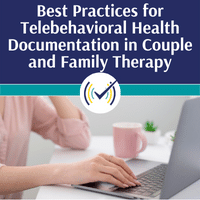Best Practices for Telebehavioral Health Documentation
in Couple and Family Therapy
Enroll in the Online Self-Study and complete the training on your own schedule.
1.5 CE hours available for behavioral health clinicians completing the Online Self-Study.
Telebehavioral health (TBH) competencies were developed to improve the quality of practice for mental and behavioral health practitioners and to establish a standard of care in TBH. While several other disciplines had embraced TBH, the field of couple and family therapy was slower in its adoption. As the couple and family therapy field shifted quickly to adopting TBH at the onset of the pandemic, couple and family therapists had to quickly adapt their documentation in offline practices to online settings.
In many cases, both the process and content of clinical documentation (communication, business documents, consent, etc.) may have been developed quickly and without feedback from other peers of professionals knowledgeable about TBH practices. In this workshop, participants will learn about the common mistakes made in the development and maintenance of documentation in TBH practice in couple and family therapy. They will also learn strategies for documentation consistent with the TBH competencies, with specific attention to best practices for clinical care, competencies for evidenced based and ethical practice, and legal and regulatory issues.
Learning Objectives:
- List three common mistakes made by couple and family therapists in TBH documentation.
- Describe the objectives within the TBH competencies dedicated clinical care and legal/regulatory issues as it pertains to documentation.
- Describe strategies for documentation consistent with the TBH competencies.
- Best Practices for Telebehavioral Health Documentation in Couple and Family Therapy
- Description
- Learning Objectives
- Instructor
- CE Hours
- How to Complete the Course and Earn CEs
- Course Policies
- Who Should Attend
- Teaching Methods
- Course Availability
Select each tab above to view specific details about this course
Telebehavioral health (TBH) competencies were developed to improve the quality of practice for mental and behavioral health practitioners and to establish a standard of care in TBH. While several other disciplines had embraced TBH, the field of couple and family therapy was slower in its adoption. As the couple and family therapy field shifted quickly to adopting TBH at the onset of the pandemic, couple and family therapists had to quickly adapt their documentation in offline practices to online settings.
In many cases, both the process and content of clinical documentation (communication, business documents, consent, etc.) may have been developed quickly and without feedback from other peers of professionals knowledgeable about TBH practices. In this workshop, participants will learn about the common mistakes made in the development and maintenance of documentation in TBH practice in couple and family therapy. They will also learn strategies for documentation consistent with the TBH competencies, with specific attention to best practices for clinical care, competencies for evidenced based and ethical practice, and legal and regulatory issues.
This course was recorded on September 12, 2022
Upon completion of this training, professionals will be able to do the following:
- List three common mistakes made by couple and family therapists in TBH documentation
- Describe the objectives within the TBH competencies dedicated clinical care and legal/regulatory issues as it pertains to documentation
- Describe strategies for documentation consistent with the TBH competencies.
Katherine Hertlein, PhD, LMFT
Dr. Hertlein earned her PhD at Virginia Tech and her master's degree from Purdue University Calumet. Across her academic career, she has published over 90 articles, 40 book chapters, and 12 books in the areas of couple therapy, infidelity, sex therapy, behavioral health, and the impact of technology on couple and and family relationships. Her contributions in sex therapy promote a paradigm shift in the treatment of sexual dysfunctions in couple relationships, are considered seminal texts, and used by couple and family therapy programs widely. Her contributions in the area of technology include the development of the core competencies for behavioral health which can be applied to all of the behavioral health disciplines, and the creation of the first comprehensive framework detailing the effect of technology on relationships which has been applied cross-culturally.
Credit Hours: CEs provided with this course include 1.5 continuing education hours of credit.
Counselors: Telehealth Certification Institute LLC has been approved by NBCC as an Approved Continuing Education Provider, ACEP No. 6693. Programs that do not qualify for NBCC credit are clearly identified. Telehealth Certification Institute LLC is solely responsible for all aspects of the programs.
Telehealth Certification Institute LLC is recognized by the New York State Education Department's State Board for Mental Health Practitioners as an approved provider of continuing education for Licensed Mental Health Counselors #MHC-0048.
Marriage and Family Therapists: Many MFT licensing boards accept our courses or one of the approvals which we have from professional associations. You can check with your board to determine if this course would be accepted by your licensing board.
Social Workers: Telehealth Certification Institute LLC #1609, is approved as an ACE provider to offer social work continuing education by the Association of Social Work Boards (ASWB) Approved Continuing Education (ACE) program. Regulatory boards are the final authority on courses accepted for continuing education credit. ACE provider approval period: 05/02/2021 – 05/02/2024. Social workers completing this course receive 1.5 clinical continuing education credits.
Telehealth Certification Institute LLC is recognized by the New York State Education Department's State Board for Social Work as an approved provider of continuing education for Licensed Social Workers #SW-0435.
Addiction Professionals: This course has been approved by Telehealth Certification Institute LLC, as a NAADAC Approved Education Provider, for educational credits, effective 2/23/2021. NAADAC Provider #193104, Telehealth Certification Institute LLC is responsible for all aspects of the programing.
Psychologists: Telehealth Certification Institute LLC is approved by the American Psychological Association to sponsor continuing education for psychologists. Telehealth Certification Institute LLC maintains responsibility for this program and its content.
Telehealth Certification Institute LLC is recognized by the New York State Education Department's State Board for Psychology as an approved provider of continuing education for Licensed Psychologists #PSY-0128.
Art Therapists: Telehealth Certification Institute LLC is recognized by the New York State Education Department's State Board for Mental Health Practitioners as an approved provider of continuing education for Licensed Creative Arts Therapists #CAT-0093.
Other Professionals: This activity qualifies for 90 minutes of instructional content as required by many national, state and local licensing boards and professional organizations. Retain your certificate of completion and contact your board or organization for specific filing requirements.
This is a non-interactive, self-study course.
To receive your certificate of completion you must complete the course in its entirety.
Online courses are completed by registering, logging in, navigating to your course using the menu (My Courses – the Course Title), completing all of the modules, completing and passing the post-test, and completing the course evaluation. Participants have 6 months from registration to access and complete online self-study courses.
Live Webinar courses are completed by registering, logging in to this website, navigating to your course using the menu (My Courses – the Course Title), attending the full course via webinar, submitting your attendance, and completing the post-test and course evaluation online.
Psychologists and other professionals seeking CE credit through our approval with the American Psychological Association are asked, but not required, to complete the course evaluation before obtaining their certificate of completion, however passing a post-test for online self-study courses and live webinars, and submitting one's attendance for live on-site and live webinars is required.
You can receive your certificate of completion by logging onto this website, navigating to the course using the menu (My Courses – the Course Title), scroll to the bottom of your course, and click on your certificate to either download it or print it.
Directions for completing a course can be found by clicking here.
Accommodations for Individuals with Disabilities
Click here to view our Accommodations for Individuals with Disabilities.
Cancellation Policy
Refunds are offered within the first 30 days for courses which have not been completed. There is a $25 service fee for refunds.
Grievance Policy
This course is intended for clinicians who provide behavioral health services.
Teaching methods for this course include recorded lectures, videos, a post-test, and a course evaluation.
This program was recorded September 12, 2022
You have six months to access online courses from the time of purchase.

Katherine Hertlein
PhD, LMFT
Dr. Hertlein earned her PhD at Virginia Tech and her master's degree from Purdue University Calumet. Across her academic career, she has published over 90 articles, 40 book chapters, and 12 books in the areas of couple therapy, infidelity, sex therapy, behavioral health, and the impact of technology on couple and and family relationships. Her contributions in sex therapy promote a paradigm shift in the treatment of sexual dysfunctions in couple relationships, are considered seminal texts, and used by couple and family therapy programs widely. Her contributions in the area of technology include the development of the core competencies for behavioral health which can be applied to all of the behavioral health disciplines, and the creation of the first comprehensive framework detailing the effect of technology on relationships which has been applied cross-culturally.




The course was so informative and I was glued to my screen for the entire duration. I received so much knowledge concerning ethics in telehealth and I am greatly encouraged to read about all the standards and policies that pertain to my practice. Thank you!.